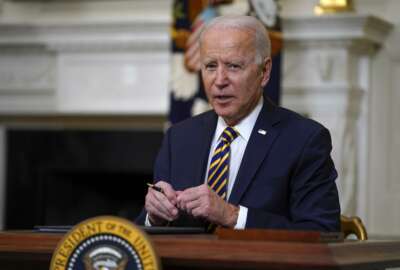
Hubbard Radio Washington DC, LLC. All rights reserved. This website is not intended for users located within the European Economic Area.
Hubbard Radio Washington DC, LLC. All rights reserved. This website is not intended for users located within the European Economic Area.
The release of a White House budget proposal resembles nothing so much as the drop of a hockey puck. Now comes the nasty scrambling. An enacted 2024 budget will...
The release of a White House budget proposal resembles nothing so much as the drop of a hockey puck. Now comes the nasty scrambling. An enacted 2024 budget will take months, and probably occur after the fiscal year starts. For the latest, the Federal Drive with Tom Temin spoke with WTOP Capitol Hill correspondent Mitchell Miller.
Interview transcript:
Tom Temin Aside from the cliches, that this is dead on arrival. What does this whole process look like days after the drop of the hockey puck?
Mitchell Miller Well, I think to carry on your analogy with the hockey, I think we are going to see a lot of lawmakers getting blasted into the boards back and forth for the next several months. This is a huge fight in the making and we’re already seeing that just in the end of last week, with some of the hearings. The House Ways and Means Committee pressing Treasury Secretary Janet Yellen (D-N.Y.) Right away from the get go. Republicans have made it very clear that they are, not only calling this dead on arrival, but they are just going to pick over it like vultures and look at all the things that are inside that nearly $6.9 trillion proposal from the White House, which, of course, is a wish list, a blueprint. And what we’re going to see is a real fight in a lot of these, particularly in these House committees, with Republicans really pushing back hard on a lot of these proposals that are inside of this huge spending plan, which the White House likes to say is going to reduce deficits in some areas. But of course, it will increase spending, potentially, by close to $2 trillion over a decade. And then on the other side, Democrats are saying, well, and the president is saying, where is your plan? House Speaker Kevin McCarthy (R-Calif.), what are you going to do? If this is such a horrible proposal, why don’t you have your own plan? Well, Republicans say they will have their own proposals, but they are going to wait and let this basically stew for a while. The House Budget Committee Chairman [Jodey] Arrington (R-Texas) has already said that he probably won’t have any kind of real proposal until, potentially even May, although his spokesman later walked that back a little bit and said maybe late in April. But nonetheless, we’re going to see a lot of back and forth on the ice here in connection with this fight.
Tom Temin Well, it even took Faulkner months and months to write a piece of fiction. So it’s no reason why an either party can’t take their time in getting this budget out. But within that 6.9 or nearly $7 trillion plan, of course, that sounds bigger than the annual federal budget, because that’s all the spending, including the entitlements and the interest on the national debt. Where in that will the discussions come for that, roughly 1.5, 1.6 trillion piece of it? That is the daily operation of the government itself, which federal employees need to know that they’ll have to do their jobs.
Mitchell Miller Right. And that’s going to actually have to be plucked out of all of that over the next several months. And House Republicans are saying that they want this to get, in some respects, back to regular order. That it will actually go through committees, that they’ve already allowed for amendments on the House floor. They are trying, in their own way, to get things back to essentially the way things used to be largely in connection with spending plans. But as you are well aware, the Senate has, over the last several years, many years, has just not come up with appropriations bills until everything got to that last minute point, which is what we saw last year. So it’ll be interesting to see how this plays out. Are they going to, from the House and Senate side, actually try to get back to what it used to be? Or are we going to eventually devolve into what it has been over the last several years? Of course, all of this could be complicated with the raising of the debt ceiling, because if that gets really complicated and gets right to the edge, then I think all bets are off. And we’re just going to see all this talk about potentially things through committee and then bringing them to the House. All the orderliness that potentially could be in Congress will just be set to the side.
Tom Temin We’re speaking with Mitchell Miller, Capitol Hill correspondent for WTOP. And there is a House Ways and Means, a Republican bill, though, on the default prevention. They think it’s called the Default Prevention Act. That sets down some, kind of throws down a hockey puck in its own way, also.
Mitchell Miller Yeah, this is a huge deal, because Republicans are trying to figure out other ways to push the envelope on raising the debt ceiling. And one of these is this proposal for the Default Prevention Act, which came up in the House Ways and Means Committee. Last week, the new chairman Jason Smith (R-Mo.), has been very aggressive on pushing back on spending priorities from the Biden administration. And essentially, if you oversimplify it, Republicans say that there should be a way that the U.S. can prioritize what it is going to pay down. It’s as if you were looking at your credit card bill and said, OK, these are the largest items that I need to pay. This is the one I really need to make sure that we get taken care of. On the other side, Democrats say that there is just no way that you can do this. And they actually tried to turn the tables last week. And Republicans have hammered the Democrats on China. Well, in the Ways and Means Committee, Richard Neal (D-Mass.), the ranking Democrat on the panel, said, well, essentially Republicans are saying they’re willing to pay China for its bills and any kind of foreign creditors, while putting the military at risk and not paying veterans and benefits for people in the United States. Now, Jason Smith, the chairman, pushed back on that and said this is not what we’re trying to do. He says that they can try to prioritize Social Security trust fund, the Federal Reserve, pension funds, etc. However, the Treasury secretary, Janet Yellen, has said, very clearly, that she does not think that this is really possible. It’s just too complicated. You cannot prioritize all of these payments, and that you will effectively cause as much financial damage as you would if you would go to a default if you tried this approach.
Tom Temin All right. So this is all still pushed down the line for the time being. But now, we are seeing the outlines of the battle. Some tangible accomplishments didn’t happen, though, last week. The Senate confirmed the new IRS commissioner. How did that go? Of course, I guess I’d say, be careful what you wish for situation walking into, what is in many ways, another one of these crucibles.
Mitchell Miller Right, yes. So the new commissioner, Daniel Werfel was pretty easily confirmed. Only one Democrat voted against him, that was West Virginia Senator Joe Manchin (D-W.Va.). Werfel is going to be under a lot of pressure because Congress has, of course, approved close to $80 billion toward improving the agency, making its response times quicker, getting all of these issues, like even the simple thing of picking up the phone and having somebody answer it from the IRS. Werfel has said during his confirmation hearings that those are some of the things that he wants to try to do. But Republicans have made it clear that they don’t really think that this is going to be money well spent. So they are going to be going over it very, very closely about how the money is actually allocated. Does money that goes to I.T. and improving computers, because we know that the computers at the IRS are hopelessly way out of date. That, will this, this all this money, is it going to be spent correctly? And Republicans have made it very clear they are going to be, as I said, watching all of this money very closely. So Werfel really under a lot of pressure, as you said. Be careful what you wish for, because he’s under a lot of scrutiny.
Tom Temin And there’s another possibility, again, on the practical front, that the Biden budget proposal has lots of tax law changes in there. Tax increases in many, many areas, repealing of other provisions that were already in the tax code. And depending on the time of year, these things get passed into law, that could really affect the IRS’ ability to turn those into their computer codes, such that what happens when you file with the IRS reflects the latest version of the tax code.
Mitchell Miller Right. Because they’ve been really behind and they’ve been trying to basically play catch up throughout the pandemic. And now they’re getting close to that point where they say that they’re really getting to the level that they should be at, even though they’re still behind. Not nearly as far behind as they were before, but as you say, with all of these new implementations, it gets complicated. And with the new changes in the tax code and having to put all of that into effect. Now, that’s a lot of work for that agency, which has already been under a lot of pressure.
Copyright © 2024 Federal News Network. All rights reserved. This website is not intended for users located within the European Economic Area.
Tom Temin is host of the Federal Drive and has been providing insight on federal technology and management issues for more than 30 years.
Follow @tteminWFED

